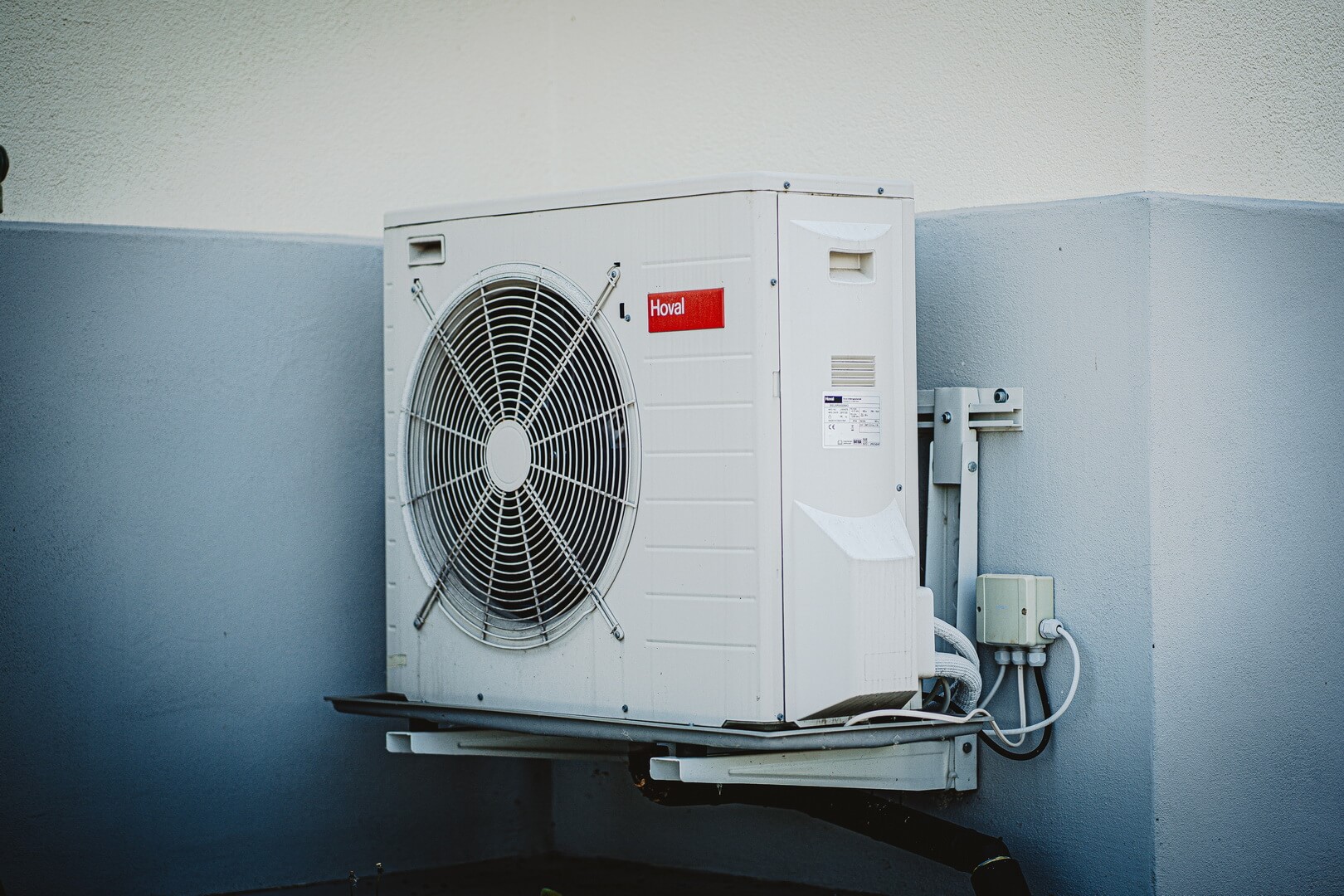
How to Choose the Right Filter for Your HVAC System
Filters are major components in an HVAC system. They are what enables the system to improve indoor air quality. Filters also provide the best defence against damage to the commercial rooftop HVAC repair and the whole HVAC system overall by removing or capturing dirt, dust, pollen and a range of other allergens. As a result of the kind of work they do, filters require to be changed frequently. But how do I choose an HVAC filter?
The COVID pandemic has impacted even the HVAC industry. With increased concerns about the risk of infections and indoor air quality, the demand for filters has spiked. As a result, shoppers are targeting HVAC filters with a MERV (Minimum Efficiency Reporting Value) of 13 and higher. The rush to upgrade to HVAC system filters with a higher MERV rating has opened doors to practical discussions on what type of air filter is best for HVAC. If you are among the people wondering what HVAC filter should I use, this post is for you. The purpose of this post is to discuss the factors you should consider when searching for the best HVAC air filtration system.
Factors to Consider Before Purchasing New Air Filter
MERV Rating
When searching for the right filters for your system, you have to think about particle-trapping efficiency. HVAC filters are available in varying grades of quality. Some are better than others. The best thing is there is a rating system to help you make the best decision. This system is known as the MERV rating. Is the higher the MERV rating better? The answer is yes. Just like with most ratings, a higher MERV rating means better quality.
The MERV scale ranges from 1 to 20. For residential systems, the filters have a MERV rating of between 1 and 16. But what MERV rating should I use?
- Low-Efficiency Filters (MERV 1 to 6)
These are low-efficiency filters. They are made of fibreglass and are usually disposable. These filters offer a basic level of protection to the HVAC but are useless when it comes to cleaning the air. They remove less than 10% of particles in the air. Furthermore, being of low quality means they get dirty fast and thus require to be changed every 1 to 3 months.
While they are cheap, the main drawback with these filters is that if they are not changed on schedule, they become clogged and will obstruct airflow. As a result, they will impact the efficiency of your HVAC system and even cause components to wear.
Air filters with a MERV rating of less than 6 are not recommended because they do very little in terms of cleaning the air. These filters are a standard on new HVAC equipment. Their work is to protect the system from debris. Your technician will immediately recommend that you install a filter with a higher rating.
- Medium-Efficiency Filters (MERV 7 to 13)
If you need better air quality, filters in this range should be on your list. These filters are recommended for residential systems. They are made of synthetic materials like cotton or pleated polyester. They remove between 30% to 50% of the particles in the air. These filters are able to filter out auto emissions, mould spores and a range of other particles that are down to 1.0 microns. In addition, they work without obstructing the airflow. There are many options available, including washable and disposable options.
- High-Efficiency Filters (MERV 14 to 16)
These filters remove even more particles from the air. They filter particles down to 0.3 microns. However, due to the fact that they restrict the flow of air, they are not ideal for residential HVAC systems. They are used mainly in restaurants, hospitals and public facilities that need heavy-duty filtration systems.
- HEPA Filters (MERV 17 to 20)
These have the highest MERV rating. They trap particles that are smaller than 0.3 microbes. The downside is that they block airflow, may lead to high utility bills, and even damage the HVAC system. These filters are used in specialized systems, commercial air filters and vacuum cleaners.
Different Types of Air Filters
Another consideration you have to make is to understand the different air filter types for the home. Knowing what is available on the market will make it easier for you to choose the filter with the performance you want. So, what is the best type of air filter?
Pleated Filter
What are pleated filters? These are filters with a bent surface. They have an accordion-like pattern that helps trap more particles without having to increase the thickness of the filter. These types of filters are constructed using synthetic materials or cotton-polyester blends. They have a MERV rating of between 6 and 13, which makes them an ideal choice when you want to improve indoor air quality.
Regarding how do pleated filters work, their accordion-like pattern offers a larger surface area and density, which helps trap more particles. The filters are able to trap mould spores, pollen, and pet dander. These filters are disposable but last longer than the flat panel filters.
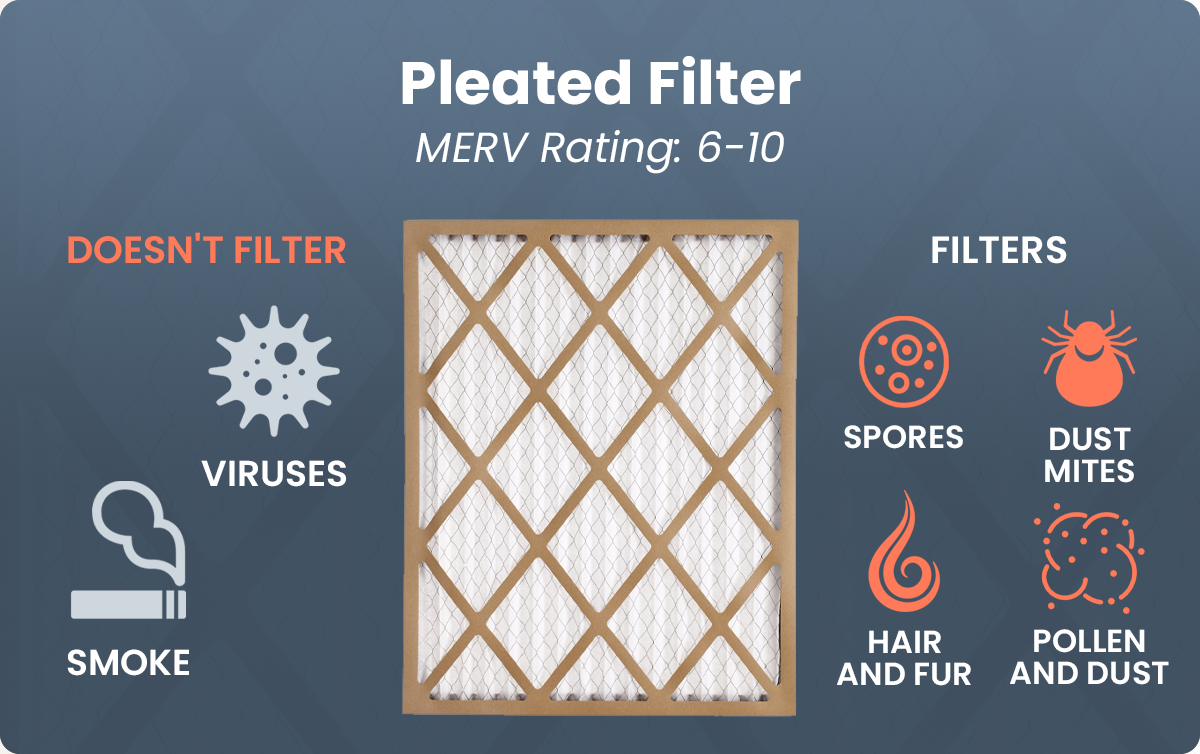
Non-Pleated Filter
What are non-pleated air filters? These are also referred to as ‘throw away’ filters because they don’t last long and are less sturdy. If you need more rigidity, you can opt for filters with a metal-reinforced fibreglass filter. These filters are made of fibreglass, electronic and electrostatic filters. They are more affordable than pleated filters and have a low MERV rating of less than 5.
Manufacturers will recommend going for the non-pleated air filters because they provide good filtration and don’t obstruct airflow. This means they do not impact the efficiency and performance of your air conditioner. Another great thing about these filters is that they can fit virtually any type and model of the HVAC system.
With that being said, what is the difference between pleated and non-pleated filters? The main difference is that pleated filters offer better air filtration and don’t require to be changed every month.
Flat Panel Filter
What is a flat panel filter? These are HVAC filters that are on a flat panel. They are made using fibrous materials like polyester, fibreglass or other synthetic materials in a cardboard frame. Although they are some of the cheapest HVAC filters, they are the least efficient, with a MERV rating of 4. The main purpose of these filters is to prevent debris like pet hair, dirt and lint from getting into the HVAC.
Flat-panel filters have a small surface for trapping particles. Unfortunately, they are also not able to remove smaller particles that contaminate the air. As a result, these filters are not designed to improve indoor air quality.
The 1-inch disposable fibreglass filters are the least efficient of flat panel filters. However, these come as a standard in HVAC systems. If you need a more efficient flat panel filter, go with those made of dense synthetic materials. All the same, always upgrade to more efficient filter types.
Washable Filter
Are washable air filters any good? From the surface, these filters look like a great idea. Being washable means there is no need to keep buying new filters. The issue is washable air filters for homes are only available in low efficiencies. They have a MERV rating of 1 to 3. Moreover, they get dirty fast, and even after regular washing, they develop mildew and bacteria, which means you will have to throw them away.
That said, do washable AC filters work? The answer is yes. They trap debris but don’t clean the air.
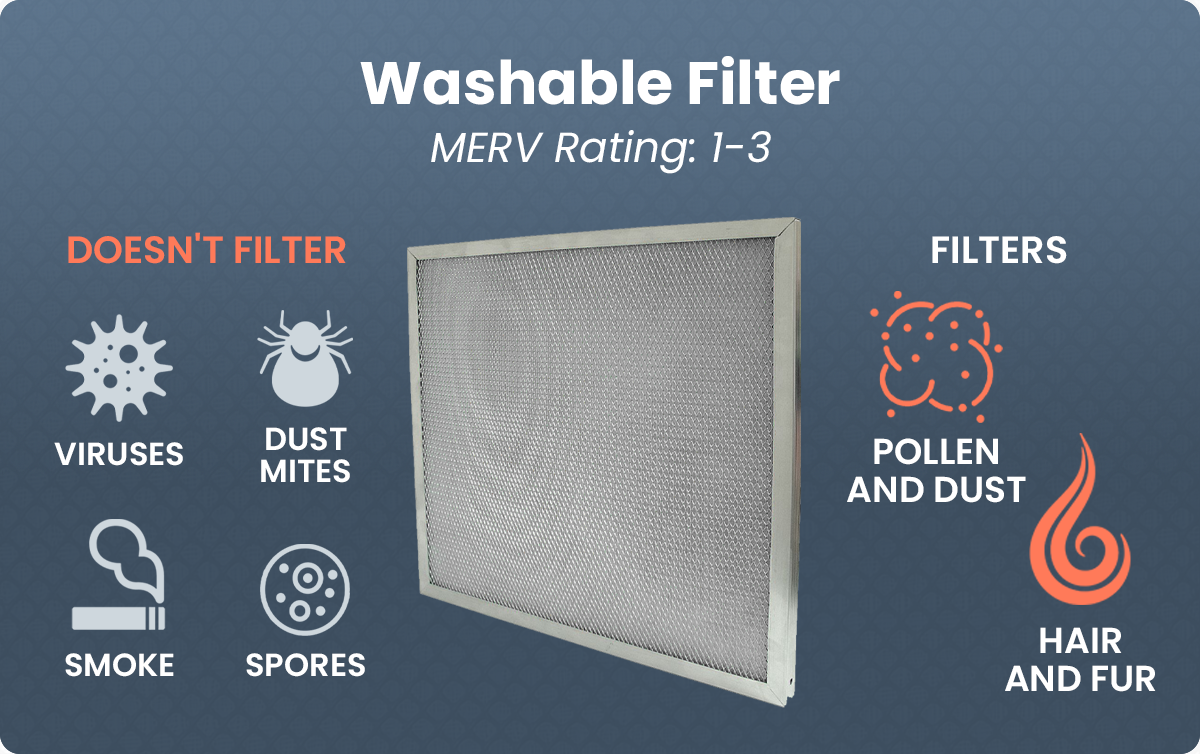
Fiberglass Filter
Fibreglass air filters have a MERV rating of 3 to 4. They are not ideal if your goal is to improve the quality of indoor air. You will also have to change out these filters every month. Consequently, these filters are very affordable. As to how efficient is fibreglass filter is, they can trap pollen, dust, dust mites, lint, paint spray, and textile fibres. The filter will not clean the air, and neither will it increase your electric or gas bills.
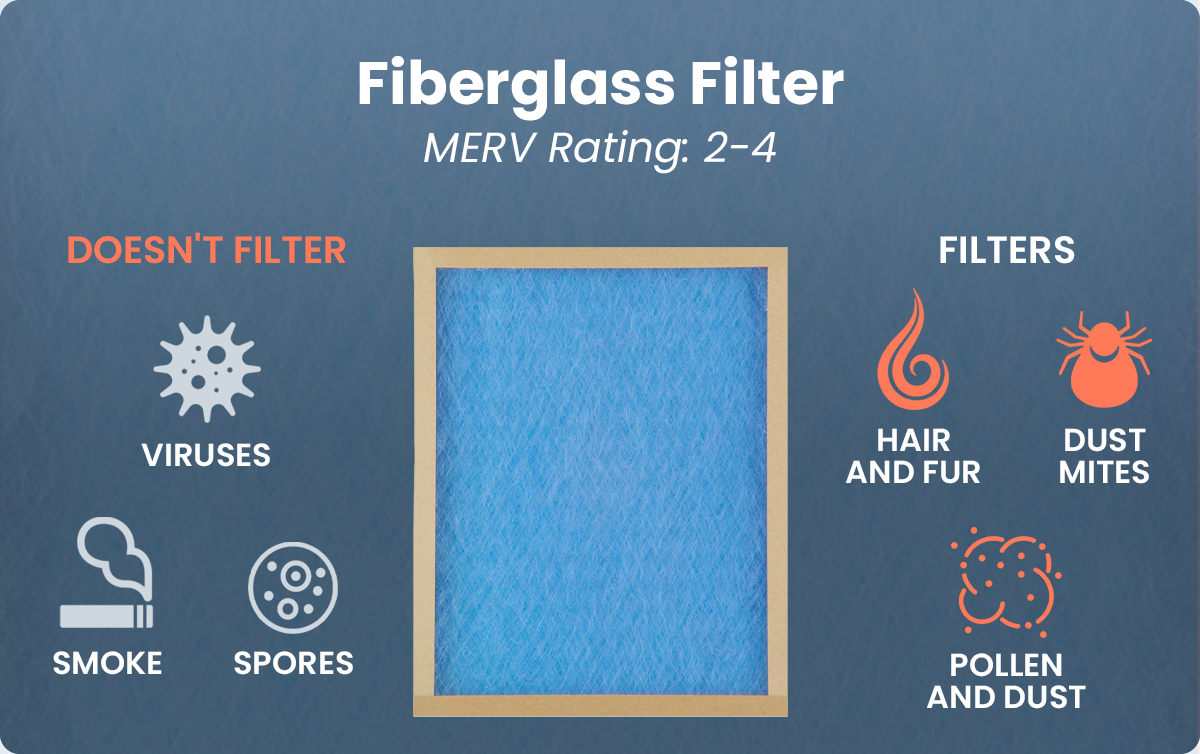
Electronic Media Filter
An electronic media filter is more efficient than both the pleated and flat-panel HVAC filters. The filter has a MERV rating of 8 to 16. This means it is more efficient in the removal of dirt and debris. It works by trapping these particles like a magnet. The filter uses electronic fibres, which attract and trap particles. The particles will remain trapped until you clean the panel. It is good to keep in mind that your air filter will be less efficient when it traps more particles.
The electronic media filter can be bought together with a furnace or can be installed as an addition to an older furnace. The casing of an electronic filter has to be installed before buying an electronic media filter. Needless to say, it can be quite expensive to install an electronic filter. All the same, the filter is perfect because you don’t need to change it every month, as is the case with most HVAC filters. Instead, you can change the filter after a year.
As to how they work, these filters have 2 to 3-inch-deep pleats. As a result, they are able to trap pollen, dust, pollen as well as microbes.
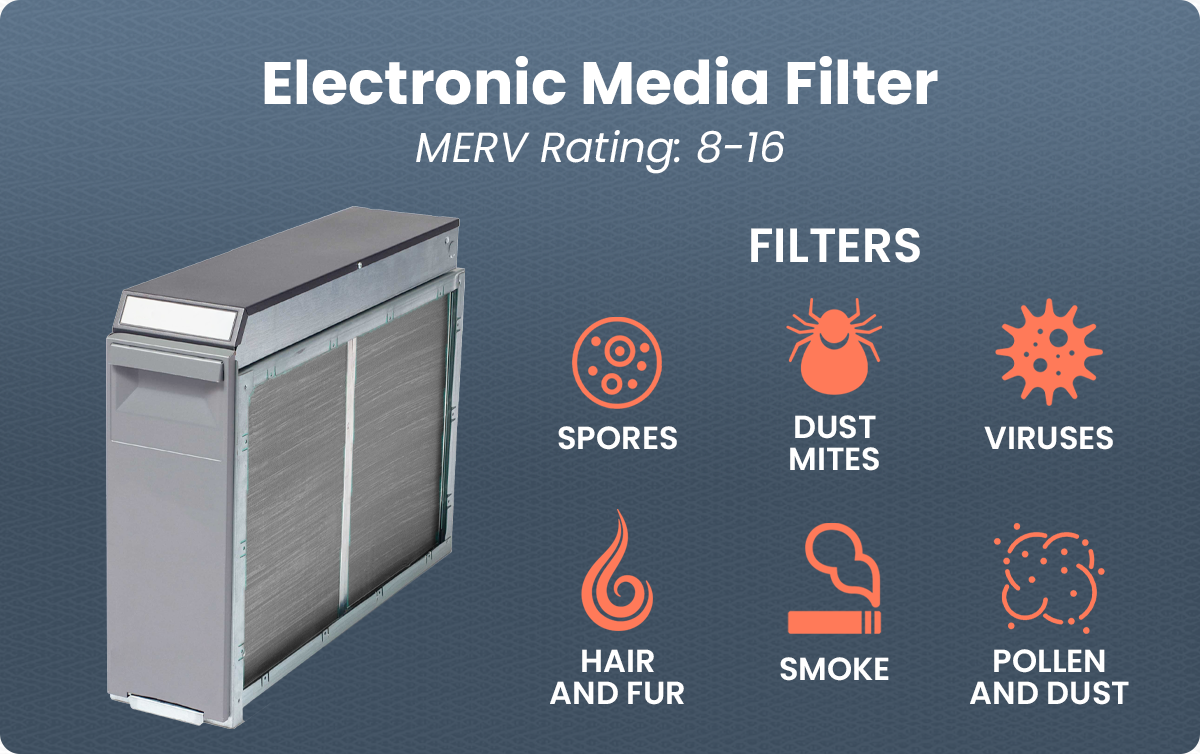
High-Efficiency Particulate Air Filter (HEPA)
HEPA filters are air filters that capture 99.97% of particles in the air. The filter captures particles that are down to 0.3 micrometres in size. This includes smoke particles and a range of bacteria and viruses. Any filter labelled as ‘HEPA’ is highly efficient, but not all of them are true HEPA filters. HEPA filters have a MERV rating of between 17 and 20.
Thanks to its high efficiency, it’s easy to assume HEPA is the best filter you can install to improve air quality. The truth is these filters are not ideal for residential uses. The reason for this is HEPA filters achieve their remarkable efficiency because they have a high density. To trap 99.97% of particles, the filter has a dense material that slows the flow of air. Bearing in mind most residential HVAC systems lack strong fan motors, the HEPA filter will end up damaging the HVAC’s motor.
If you wish to boost air quality in a single room, you can opt for a portable air cleaner with a HEPA filter. If you need a HEPA filter for the entire house, your HVAC system must be able to handle it. A professional can install a HEPA bypass system in the ductwork. Such a system will guide part of the air through the HEPA filter, thus improving air quality without straining the motor.
Ultraviolet (UV) Light System
The ultraviolet light system uses UV light to destroy microorganisms on a molecular level. These sanitizing systems use the same technology as those in healthcare settings. In addition to improving air quality, they sterilize mould, viruses, bacteria and allergens. Use this system together with a medium-range MERV-rated filter.
Filter’s Resistance to Airflow
A filter’s resistance to the flow of air is an important consideration to make. This is because high resistance to airflow leads to more energy consumption by the HVAC as it tries to push air through. Energy expenditure accounts for 81% of an air filtration system annually. Needless to say, higher efficiency filters have greater resistance to airflow.
Filter’s Design and Materials
You also have to consider the design and materials used in filters. Some filter designs are easier to install and seal better. However, the perfect design should not shred or absorb moisture. The best options are those made using a blend of cotton and synthetic media or polyester in terms of materials. These offer greater surface area, which helps eliminate more particles from the air. This is why pleated filters are more popular. They have a MERV rating of 6 to 13 and can filter particles in the 3 to 10-micron range. These filters are also 35 to 90 percent more efficient.
You will also find extended-surface filters made with fibreglass, synthetic or glass-fibre/cellulose media. These include rigid-cell, bag or pocket, V-bank and aluminum-separator filters. Pocket fillers offer a greater surface area for filtration than pleated filters. This leads to maximum efficiency and a MERV rating of 11 to 15.
Filter Size
You need the right size of the filter. Keep in mind that some air conditioners will only work with filters that are an inch thick, whereas others require thicker filters. Start by ensuring the dimensions of your selected filter is compatible with your system. While you will find several standard sizes, not all filters will work with your HVAC system.
It is important to note that a filter that is an inch smaller or bigger will not work with your HVAC system. Air filters have to seal tightly in order to work efficiently. That is why your selected filter has to be a perfect fit to eliminate contaminants from the air. Know the required filter size for your HVAC system before you start shopping.
Disposable vs. Reusable Filter
Last but not least, you have to weigh the pros and cons of disposable and reusable filters. You will come across filters that can be reused. These offer good service for the lifetime of the HVAC system provided you follow cleaning guidelines. There are also disposable filters that are cheaper and have a low to medium MERV rating.
Reusable filters offer a lower total cost of ownership over the life of your furnace. This is because you only replace them once every 3 years or even more. Since they can be used several times, the initial high cost is balanced out. Ultimately, reusable filters are more affordable than disposable ones. The drawback is you have to remove, disassemble and clean them thoroughly every month. You also have to allow them to dry completely before reinserting them into the HVAC.
Most of the HVAC filters you will find are disposable. They trap more airborne particles and are thus the perfect option for a household with asthma or allergy sufferers.
-
Main Showroom and HQ
-
Air Makers' Toronto Office
-
Air Makers' Brampton Office
-
Air Makers Warehouse #2
